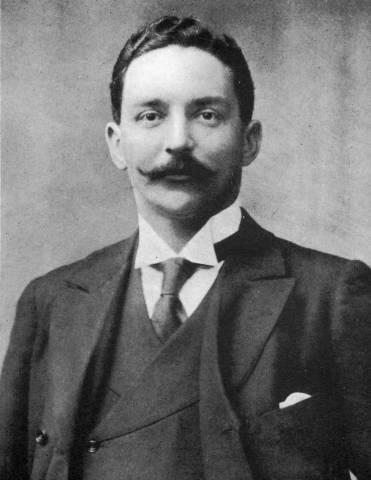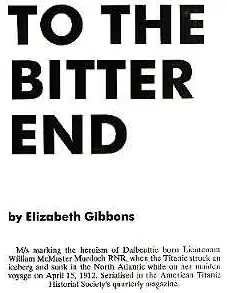24. Bruce Ismay
Collapsible C, in addition to the gunfire episode, became the site of the night's most famous controversy, marginally less dramatic than the firing but again involving Murdoch and destined to become the focus of a public debate on moral obligation and heroism. Company Chairman Ismay had made himself variously conspicuous during the voyage, and while he had paid a courtesy call on the bridge on sailing day he had thereafter confined himself to the role of passenger, if a uniquely placed one. He was privy to a least one ice warning, carrying it around for hours on April 14, 1912, until Captain Smith requested it back.
Immediately following the collision, he had gone onto the bridge and there learned that his company flagship was going to founder.
Ismay's reaction to this news is not known, but his next appearance, calm enough under the circumstances, was alongside Murdoch, helping to load passengers into the starboard lifeboats. Murdoch's soothing manner may have had the same calming influence on Ismay, who knew the worst, as it did on those who did not. The glimpses of Ismay behaving in an excited manner while still on the Titanic, most notably the occasion when Fifth Officer Lowe swore at him for interference, seem to have happened when Murdoch was not nearby. Steward Alfred Crawford recalled one telling incident, while No. 5 was being lowered. Murdoch was working one of the falls and a crew member the other when Ismay advised that the boat was being lowered unevenly:
"Mr. Crawford. Mr. Ismay stopped Mr. Murdock from lowering the boat a bit because the after end was getting hung up. Mr. Murdock called out to the aft man that was lowering the fall to lower away all the time, that he would beat him, and they lowered the boat to the water." (Page 826)
Murdoch's threat (an illuminating return to the age of sail) was a prelude to his response to the panic an hour hence and the crushing rejoinder of the revolver. Ismay's behavior here at No. 5 was both perceptive and responsible. He seems to have behaved in the manner expected of him until Collapsible C.

J. Bruce Ismay
Moral decisions are made in an instant. Ismay noted a vacant place, and simply stepped into it and sat down. Both Murdoch and Wilde saw him one moment on the deck and the next in No. C. Neither moved to evict him. Quartermaster Rowe, working the after fall from inside the collapsible, watched Wilde intently, to see if he would do or say anything; he did not. (Page 521) The non action was mostly, and almost certainly, the incredulity of two employees who see the boss do something contrary to regulations, but it may also have been kindness; Ismay was no sailor and he was well known to both from prior maiden voyages. He was also not the only man, crew aside, to enter No. C; First Class passenger William Carter (whose family was still waiting on A Deck to board No. 4) stepped in with Ismay, and was not ejected. Quartermaster Rowe remembered that no one spoke to Carter, either. (Page 521)
It is certain that if Murdoch, at least, had wanted Ismay back on board the chairman would have been pulled out unceremoniously and at once. No twinge of self interest would have interposed: Murdoch knew quite well no interests remained to protect. Even the habit of deference is unlikely to have intervened; Murdoch's obedience from childhood had been directed toward his captains. He was, in hard fact, in the enviable position of a man free to do what he believes just, because he has nothing to lose. Whatever his motive, Murdoch, like Wilde, simply stared.
When Ismay left the Titanic, her forward well deck was already under water. (Page 524) The impulse that had compelled him into No. C would remain unexpressed for the rest of his life. William Carter would support Ismay against criticism, but his was dubious aid; Carter's own behavior that night helped land him in the divorce courts. Any argument that Ismay was instructed to get into No. C is eviscerated by his own testimony in New York. He assured the Senate, oblivious to the meaning of his words, that he had stepped in of his own volition. (Page 11) He felt he had done nothing questionable, and the naivete of his testimony reflects his serene self righteousness.
Ismay went home to Britain in May, to the company of whatever invisible creatures with Greek names were waiting for him on the dock. He had already discovered that he had stepped from the boatdeck of the Titanic into a daylight nightmare that would continue for the rest of his life. Admiral Alfred Thayer Mahan raged in print that Ismay's moral duty as chairman of White Star was to be the last man off the Titanic save for her captain. Most Americans agreed, regarding Ismay with a contempt unshared in the Twentieth Century by anyone except the Kaiser. It was a steel spined view of duty common to the post Civil War generation that had pushed the frontier westward and snatched an overseas empire in 1898, and it was echoed by men in London who knew no gentleman could enter his club again if absent when his regiment went into battle.
Lord Mersey, generous and gracious, stated at the British Inquiry that there was no reason why Ismay should add his life to those already lost, but Attorney General Sir Rufus Isaacs argued that the subject involved matters exclusive to the realms where reason does not penetrate. Whatever else it had been, Ismay's action was the ultimate cultural error: it was bad form.
Ismay died in 1937, long since forced out of White Star, championed by a few British voices mostly out of annoyance at the Senate but excoriated by most. Sir Rufus, as Lord Reading, went to India as Viceroy. Someone in a very high place apparently shared his views on duty.
